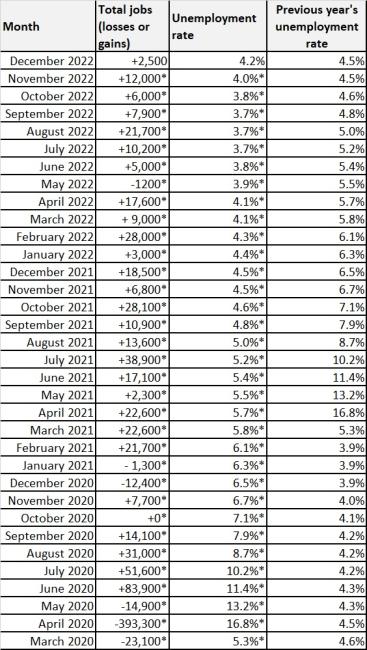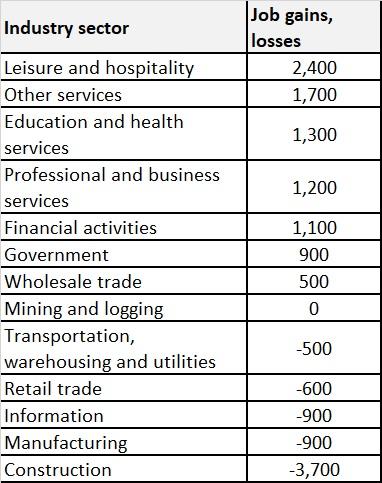Released on
FOR IMMEDIATE RELEASE
Contact: media@esd.wa.gov
OLYMPIA – Washington’s economy gained an estimated 2,500 jobs (seasonally adjusted) in December.
Job growth was highest in the following industries: Leisure and hospitality, other services, education and health services, professional and business services and financial services.
Washington’s monthly unemployment rate rose from 4.0% to 4.2% in December.
"Job growth appears to be slowing,' said the Employment Security Department’s (ESD) State Economist Paul Turek. "The December jobs report brings another sign that the labor market is beginning to soften but still remains very strong.'
Visit ESD’s website to view the entire Monthly Employment Report for December.
ESD paid unemployment insurance benefits to 52,715 people in December, an increase of 9,945 paid claims over the previous month. Typical seasonal increases in paid claims within agriculture and construction contributed to the overall increase in paid claims over the month.
National unemployment rate
The national unemployment rate decreased slightly in December from 3.7% to 3.6%. For comparison, the national unemployment rate (revised) for December 2021 was 3.9%.
Updated state preliminary data for November 2022
- The preliminary estimated gain of 13,100 jobs for November 2022 was revised downwards to a gain of 12,000 jobs.
- The seasonally adjusted monthly unemployment rate was confirmed at 4.0%.
Washington shows strong job growth over 2022
Washington gained an estimated 121,200 jobs from December 2021 – December 2022, not seasonally adjusted. Private sector employment rose by 3.8%, up an estimated 110,000 jobs, while public sector employment rose by 2.0%, up an estimated 11,200 jobs.
Labor force numbers show mild contraction
The state’s labor force in December numbered 4,002,500 – a decrease of 600 people from the previous month.
In the Seattle/Bellevue/Everett region, the labor force decreased by 2,600 over the same period.
Childcare issues, aging workforce and shifted work preferences are all contributing factors to a decrease in the labor force over the month.
Labor force is defined as the total number of people, both employed and unemployed, over the age of 16. Layoffs and labor force participation are not necessarily connected. When someone is laid off but still seeking work they remain a part of the labor force. A drop in the labor force means the individual has left work and hasn't been actively seeking employment for more than four weeks.
From December 2021 to December 2022, the state’s labor force increased by 56,300, while the Seattle/Bellevue/Everett region increased by 43,300.
From November to December, the number of people who were unemployed statewide increased from 160,800 to 165,500. In the Seattle/Bellevue/Everett region, the number of people who were unemployed increased from 52,000 to 53,200 over the same period.
Of the industry sectors, in December:
- Seven expanded
- Five contracted
- One was unchanged
Private sector employment increased by 1,600 jobs while government employment increased by 900 jobs.
The largest decrease in jobs during the past month was in the construction sector. Specialty trade contractors, who perform activities such as pouring concrete, site preparation, plumbing, painting, and electrical work, accounted for 2,900 of the 3,700 construction jobs lost. Historically, this sector is down during the month of December averaging 3,500 jobs lost since 1990.
From December – December 2022, eleven major industry sectors expanded and two contracted
The three industry sectors with the largest employment gains year over year, not seasonally adjusted, were:
- Leisure and hospitality, up 30,100 jobs.
- Education and health services, up 22,500 jobs.
- Professional and business services, up 19,400 jobs
Table 1: Washington’s total jobs

*Revised from previous preliminary estimates. Preliminary monthly estimates for job losses or gains are based on a small Bureau of Labor Statistics payroll survey. Actual figures reported the following month are based on a more complete survey.
Table 2: Job gains and losses by industry

Learn more about ESD’s monthly employment reports
Every month, the Employment Security Department publishes preliminary seasonally adjusted estimates for the prior month’s job growth and unemployment. We also publish confirmed data for the month before last. See the entire Monthly Employment Report on our website.
Monthly Employment Report publication schedule for 2023
|
Preliminary data for the month |
State and Metropolitan Division data release |
All other county data released |
|
January |
March 1, 2023 |
March 7, 2023 |
|
February |
March 22, 2023 |
March 28, 2023 |
|
March |
April 19, 2023 |
April 25, 2023 |
|
April |
May 17, 2023 |
May 23, 2023 |
|
May |
June 14, 2023 |
June 20, 2023 |
|
June |
July 19, 2023 |
July 25, 2023 |
|
July |
August 16, 2023 |
August 22, 2023 |
|
August |
September 13, 2023 |
September 19, 2023 |
|
September |
October 18, 2023 |
October 24, 2023 |
|
October |
November 15, 2023 |
November 21, 2023 |
|
November |
December 20, 2023 |
December 26, 2023 |
|
December |
January 17, 2024 |
January 23, 2024 |
See more labor market information and tools, including interactive Tableau graphics, to highlight popular information and data.
Employment Security is a proud partner in the statewide WorkSource system, which provides employment and training assistance to job seekers and businesses. WorkSourceWA provides access to thousands of Washington jobs and other employment resources. WorkSource staff can connect job seekers with employers hiring right now in their community, identify training opportunities or help them brush up on application and interview skills. Job seekers and employers can find their nearest WorkSource center on the WorkSource office locator page.
The U.S. Bureau of Labor Statistics (BLS) updated its 'alternative measures of labor underutilization' for states to include annual averages for 2021. One such alternative measure is the U-6 rate, which considers not only the unemployed population in the official 'U-3' unemployment rate, but also marginally attached workers and those employed part time for economic reasons. The U-6 rate is defined by BLS as the 'total unemployed, plus all marginally attached workers, plus total employed part time for economic reasons, as a percent of the civilian labor force plus all marginally attached workers.' This U-6 measure measures the 'unemployed, underemployed, and those who are not looking but who want a job.'
U-6 unemployment rate
The U-6 unemployment rate for the four-quarter period from fourth quarter 2021 through third quarter 2022 for Washington state was 7.7 percent. This was lower compared to the 8.1 percent U-6 unemployment rate for the third quarter 2021 through second quarter 2022 period.
The U.S. U-6 unemployment rate for the four-quarter period from fourth quarter 2021 through third quarter 2022 was 7.1 percent.

